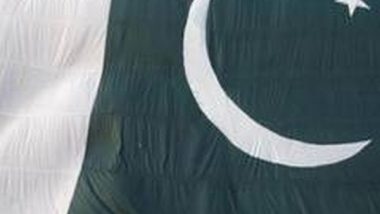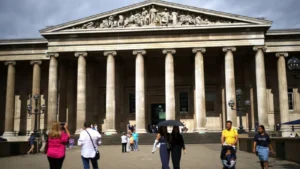
KARACHI: St Joseph’s Catholic Church at Gujjar Nullah is being destroyed because of some anti-encroachment issues.
A group of civil society activists and media personnel arrived at Gujjar Nullah for a tour arranged by the Urban Resource Centre (URC) where the anti-encroachment drive has been under way for months now. Recently, various areas of worship have also been destroyed.
The St Joseph’s Catholic Church is the only church that is still standing of the four churches of Sadiq Nagar, the part of Gujjar Nullah that comes under Gulberg. Three Philadelphia Pentecostal Churches of the protestant Christian community have already been razed.
Across the nullah there is Kausar Niazi Colony, which comes under North Nazimabad. The nullah connects both areas from where worshippers would come to pray at these churches. But as one of them, Rehana Sohail, says they have very few people attending services at the remaining church now. “There used to be over 150 people gathered here every Sunday and it would get difficult to accommodate them all. But now there are barely 20 or 30. It is more than just losing faith. The elderly are afraid of the remaining structure falling on them and most women don’t come anymore due to lack of privacy after the facade was broken two weeks ago,” she said.
Master Zohaib Javed said that the bulldozers broke their church in such a way that a big part of their roof fell itself due to lack of support after the walls and pillars were broken down. “We wanted to rebuild our church and raise a new wall in the front but then we were informed that Frontier Works Organisation people were also going to come for their own survey. This is how it has come under various surveys and new cuttings. Bit by bit it is vanishing,” he said.
Zahid Farooq of URC told Dawn that the St Joseph’s Catholic Church also used to be a space for meetings of area residents, most of whom are Christians.
Social activist Sunila Anwar, who lives nearby, said that when the anti-encroachment people first surveyed the area and took measurements, they had said that they would have to break around 11 per cent of the church’s building that was encroaching on the 30 feet that they wanted to clear around the nullah. “But it has come under the cutting area for the third time now and in this process they have broken more than what they had been saying,” she said.
Younis Gill, another area resident, said that they come and break some wall and then they come again to draw a new red line and like this more and more gets broken. “Not just the church, they have been doing it for all the houses here as well,” he pointed out.
“My own home was to lose 53 per cent, which was most of its frontage but by now they have bulldozed over 60 per cent and not even given us compensation. The cheque that we were given bounced, too. Besides, there are three to four families living under one roof here and the compensation is given to only one. What are the rest supposed to do?” he said.
Arif Sardar, another resident of the area, said that if they argue with the people there to break portions of their property, they break more than they had said they would as a punishment. “So we are to allow them to do as they please without uttering a word,” he said.
Karamat Ali of Pakistan Institute of Labour Education and Research then asked the residents to at least be strong enough to put up a united front before the bulldozers. “You have to question why this is happening. You cannot allow it to happen just like that because what is happening is wrong. It is illegal. They must provide you with an alternative place first before carrying out such an operation,” he told the people.
Najma Iqbal, one of the few Muslim residents of Sadiq Nagar, pointed to her remaining dwellings with tears running down her cheeks. “It used to be a three-storey structure with 10 rooms. I don’t have a husband, brother or father and nine of those 10 rooms were rented out. They were my only means of earning. But most of my building is gone now and there are fresh red markings on its remaining walls. After they are done breaking according to their new plans, I will only be left with room to fit a chair in there. How will I be able to live there?” she cried.
Nuzhat Shirin, chairperson, Sindh Commission on the Status of Women, tried to console the woman who had come out to prepare her food in a common makeshift kitchen set up by the residents. “Women are the worst hit by this anti-encroachment drive,” she said. “Most homes here have lost their kitchens and bathrooms and the poor women have no privacy left.”
Qazi Khizar, vice chairperson of Human Rights Commission of Pakistan, then pointed to the piles of rubble lying around the broken buildings. “No one removes the rubble and it has piled up to raise the ground level around the buildings here. Now when it rains, all the water will go into people’s homes instead of flowing into the nullah,” he said.
“And in all this survey work and new markings, the anti-encroachment drive people are only interested in measuring the buildings and structures. None of them are seen measuring the nullah here or cleaning it. Meanwhile, three of the five tunnels to carry the nullah flow out are completely choked with silt and garbage,” he said.






